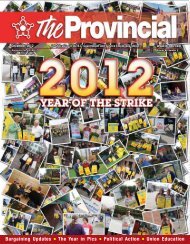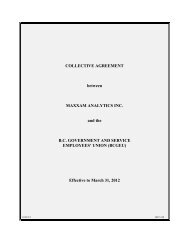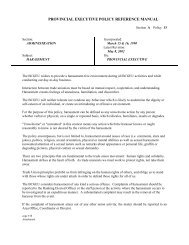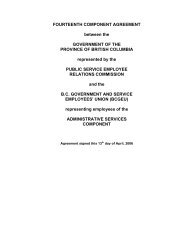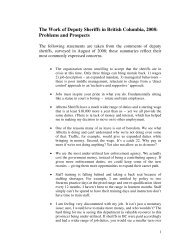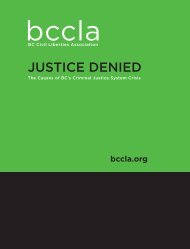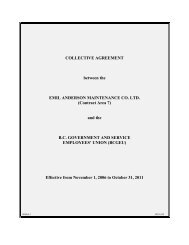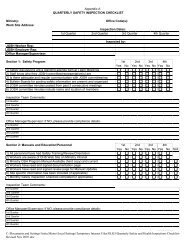Brief to the Firestorm 2003 Provincial Review - BC Government and ...
Brief to the Firestorm 2003 Provincial Review - BC Government and ...
Brief to the Firestorm 2003 Provincial Review - BC Government and ...
Create successful ePaper yourself
Turn your PDF publications into a flip-book with our unique Google optimized e-Paper software.
<strong>Brief</strong> <strong>to</strong> <strong>the</strong> Fires<strong>to</strong>rm <strong>2003</strong> <strong>Provincial</strong> <strong>Review</strong><br />
--------------------------------------------------------------------------------------------------------<br />
Submitted by <strong>the</strong> B.C. <strong>Government</strong> <strong>and</strong> Service Employees’ Union<br />
George Heyman, President<br />
November 27, <strong>2003</strong>
Introduction<br />
I welcome <strong>the</strong> opportunity <strong>to</strong> make this presentation on behalf of <strong>the</strong> 58,000<br />
members of <strong>the</strong> B.C. <strong>Government</strong> <strong>and</strong> Service Employees’ Union. The <strong>BC</strong>GEU<br />
represents thous<strong>and</strong>s of public workers in <strong>the</strong> Ministry of Forests (MoF), Office of <strong>the</strong><br />
Fire Commissioner (OFC), <strong>Provincial</strong> Emergency Program (PEP), Ministry of<br />
Human Resources (MHR), B.C. Housing Commission, <strong>and</strong> o<strong>the</strong>r areas where public<br />
workers have official responsibilities <strong>to</strong> respond <strong>to</strong> emergency situations, such as <strong>the</strong><br />
wildfires of <strong>2003</strong>.<br />
<strong>BC</strong>GEU members <strong>to</strong>ok on significant roles in management, coordination, <strong>and</strong><br />
administration in areas of fire suppression, evacuation, communications, comm<strong>and</strong><br />
structure, volunteer coordination, emergency services, <strong>and</strong> general assistance.<br />
Many <strong>BC</strong>GEU members also volunteered <strong>to</strong> work with PEP, <strong>the</strong> Red Cross, <strong>the</strong>ir<br />
local fire departments, <strong>and</strong> <strong>to</strong> help <strong>the</strong>ir families, neighbours, <strong>and</strong> communities in<br />
countless o<strong>the</strong>r ways during <strong>the</strong>ir time of need.<br />
Audi<strong>to</strong>r General’s Report 2001<br />
In 2001, <strong>the</strong> Audi<strong>to</strong>r General of B.C. submitted a comprehensive audit report titled<br />
Managing Interface Fire Risks. You are likely aware of <strong>the</strong> highlights of that report,<br />
<strong>and</strong> <strong>the</strong> 37 recommendations that flowed from <strong>the</strong> audit.<br />
In short, <strong>the</strong> Audi<strong>to</strong>r General stated that while a serious wildfire hazard exists around<br />
communities of all sizes in many high <strong>and</strong> moderate risk areas in B.C. – <strong>the</strong> general<br />
public has limited awareness of <strong>the</strong> problem. Wildfire prevention <strong>and</strong> mitigation<br />
measures need <strong>to</strong> be improved upon <strong>and</strong> implemented. Also, we need <strong>to</strong> improve our<br />
capabilities for response <strong>and</strong> recovery, in <strong>the</strong> event of a major wildfire.<br />
<strong>BC</strong>GEU <strong>Brief</strong> <strong>to</strong> <strong>the</strong> Fires<strong>to</strong>rm <strong>2003</strong> <strong>Provincial</strong> <strong>Review</strong> – November <strong>2003</strong> 1<br />
RP:st opeiu 378 CEP 467
As noted in <strong>the</strong> Audi<strong>to</strong>r General’s January <strong>2003</strong> follow-up report, some of his original<br />
recommendations have been acted on. However, most of his recommendations have<br />
only been partially implemented, or not followed at all.<br />
The reality is that <strong>the</strong> provincial government has made, <strong>and</strong> continues <strong>to</strong> make,<br />
massive cuts <strong>to</strong> budgets <strong>and</strong> staff in all areas, making it impossible <strong>to</strong> fully achieve<br />
many of <strong>the</strong> Audi<strong>to</strong>r General’s recommendations.<br />
Massive Cuts<br />
One of <strong>the</strong> Audi<strong>to</strong>r General’s key recommendations was <strong>to</strong> establish a <strong>Provincial</strong><br />
Interface Fire Committee involving <strong>the</strong> Ministry of Forests, <strong>the</strong> Office of <strong>the</strong> Fire<br />
Commissioner <strong>and</strong> <strong>the</strong> <strong>Provincial</strong> Emergency Program, <strong>to</strong> address <strong>and</strong> act on <strong>the</strong><br />
recommendations identified in <strong>the</strong> report. The committee was appointed. However,<br />
no funding was allocated <strong>to</strong> <strong>the</strong> committee, limiting its ability <strong>to</strong> function. I quote<br />
from <strong>the</strong> Audi<strong>to</strong>r General’s follow-up report, dated January <strong>2003</strong>:<br />
No specific funding for <strong>the</strong> committee is currently available. Ability <strong>to</strong> fund<br />
committee activities by individual ministries is at present limited because of<br />
budget pressures.<br />
In reply <strong>to</strong> <strong>the</strong> 2001 recommendation <strong>to</strong> “mitigate interface fire risks” <strong>the</strong> provincial<br />
bodies responsible for managing interface fire risk noted that since:<br />
…(it) would require a commitment of significant funds by both <strong>the</strong><br />
provincial government <strong>and</strong> local governments, <strong>the</strong> committee will endeavour<br />
<strong>to</strong> complete <strong>the</strong> development of a framework discussion paper for<br />
consideration by government within <strong>the</strong> <strong>2003</strong>/2004 fiscal year.<br />
The three provincial government entities with responsibilities for managing interface<br />
fire risks, ei<strong>the</strong>r directly or in support of local governments do not have <strong>the</strong> resources<br />
or staff <strong>to</strong> address or put in<strong>to</strong> practice, in a meaningful way, <strong>the</strong> findings of <strong>the</strong><br />
Audi<strong>to</strong>r General’s 2001 report.<br />
<strong>BC</strong>GEU <strong>Brief</strong> <strong>to</strong> <strong>the</strong> Fires<strong>to</strong>rm <strong>2003</strong> <strong>Provincial</strong> <strong>Review</strong> – November <strong>2003</strong> 2<br />
RP:st opeiu 378 CEP 467
Ministry of Forests<br />
Since it <strong>to</strong>ok office, <strong>the</strong> Campbell government has slashed staffing levels by 35 percent<br />
in <strong>the</strong> Ministry of Forests. Additional budget cuts have closed district offices, <strong>and</strong><br />
caused fur<strong>the</strong>r disruption due <strong>to</strong> restructuring <strong>and</strong> downsizing, <strong>and</strong> <strong>the</strong> layoffs of<br />
skilled <strong>and</strong> experienced workers.<br />
Office of <strong>the</strong> Fire Commissioner<br />
The number of provincial Fire Safety Officers was reduced from 27 <strong>to</strong> nine, in 1995.<br />
Administrative support staff were also cut.<br />
<strong>Provincial</strong> Emergency Program<br />
The <strong>Provincial</strong> Emergency Program Strategic Objectives 2001/2002 highlighted funding<br />
<strong>and</strong> workload pressures that impeded or prevented work on critical issues relating <strong>to</strong><br />
provincial emergency programs. In fact, I am shocked that no action could be taken<br />
on “Critical Infrastructure Rapid Damage Assessment” (that would maximize <strong>the</strong><br />
preservation of life in <strong>the</strong> event of a major earthquake or tsunami), due <strong>to</strong> “o<strong>the</strong>r<br />
workload pressures.”<br />
The direc<strong>to</strong>r of PEP made it clear <strong>to</strong> <strong>the</strong> St<strong>and</strong>ing Committee on Public Accounts on<br />
December 12, 2001 that due <strong>to</strong> “current resource levels” <strong>the</strong> expectations of <strong>the</strong><br />
Audi<strong>to</strong>r General’s recommendations around wildfires may be beyond current program<br />
capabilities.<br />
<strong>BC</strong>GEU <strong>Brief</strong> <strong>to</strong> <strong>the</strong> Fires<strong>to</strong>rm <strong>2003</strong> <strong>Provincial</strong> <strong>Review</strong> – November <strong>2003</strong> 3<br />
RP:st opeiu 378 CEP 467
O<strong>the</strong>r Ministries<br />
In addition <strong>to</strong> budget <strong>and</strong> staffing cuts <strong>to</strong> <strong>the</strong> three provincial bodies responsible for<br />
interface fire prevention, response, <strong>and</strong> recovery – o<strong>the</strong>r key government ministries<br />
have faced, <strong>and</strong> continue <strong>to</strong> face, massive budget cuts <strong>and</strong> downsizing. These cuts<br />
affect our ability <strong>to</strong> respond <strong>to</strong> wildfire emergency situations.<br />
For example, <strong>the</strong> Ministry of Human Resources, responsible for providing emergency<br />
financial aid <strong>to</strong> individuals <strong>and</strong> families, has experienced major budget <strong>and</strong> staff cuts<br />
since 2001.<br />
Many government employees in various ministries throughout government are<br />
registered as volunteers with <strong>the</strong> <strong>Provincial</strong> Emergency Program. However, <strong>the</strong>ir<br />
ability <strong>to</strong> leave <strong>the</strong>ir jobs <strong>and</strong> volunteer during times of emergency – as needed during<br />
<strong>the</strong> wildfires of <strong>2003</strong> – is limited due <strong>to</strong> recent staff layoffs, budget cuts, <strong>and</strong> resulting<br />
workload pressures.<br />
<strong>BC</strong>GEU <strong>Brief</strong> <strong>to</strong> <strong>the</strong> Fires<strong>to</strong>rm <strong>2003</strong> <strong>Provincial</strong> <strong>Review</strong> – November <strong>2003</strong> 4<br />
RP:st opeiu 378 CEP 467
Observations <strong>and</strong> Recommendations<br />
Ministry of Forests - Fuel Build-up<br />
The wildfires of <strong>2003</strong> in B.C. were caused by lightning or people, but <strong>the</strong> build-up of<br />
fuel at or near <strong>the</strong> ground level is what caused many of <strong>the</strong>se fires <strong>to</strong> explode in<br />
drought conditions.<br />
The Ministry of Forests does not budget for fuel reduction programs such as thinning<br />
<strong>and</strong> brushing, slashing, prescribed burns, or harvesting saleable timber through partialcut<br />
treatments. This government, which is charged with <strong>the</strong> responsibility of<br />
managing <strong>the</strong> Forest L<strong>and</strong> Base, is not necessarily addressing <strong>the</strong> role of fire <strong>and</strong> levels<br />
of fuel build-up.<br />
Ministry staffing <strong>and</strong> budget cuts impede even <strong>the</strong> limited application of fuel<br />
reduction treatments, <strong>and</strong> prevent <strong>the</strong> introduction of much-needed programs.<br />
Following <strong>the</strong> wildfires of <strong>2003</strong>, we have learned <strong>the</strong> hard way that “doing nothing”<br />
costs our communities <strong>and</strong> province in financial, environmental, <strong>and</strong> social terms. We<br />
need <strong>the</strong> provincial government <strong>to</strong> commit <strong>to</strong> a sustained <strong>and</strong> properly-funded fuel<br />
management strategy.<br />
A fuel reduction treatment program, using both mechanical methods <strong>and</strong> prescribed<br />
burning under <strong>the</strong> expert direction of qualified MoF personnel, would go a long way<br />
<strong>to</strong>wards reducing <strong>the</strong> interface wildfire hazard.<br />
The MoF needs <strong>to</strong> establish a budget line for prevention of wildfires. It must provide<br />
provincial leadership <strong>and</strong> work with <strong>the</strong> various stakeholders community by<br />
community <strong>to</strong> reduce <strong>the</strong> explosive fuel build-up in moderate <strong>and</strong> high-risk areas.<br />
During <strong>the</strong> winter of 2002, Parks Canada partnered with MoF, Radium Town<br />
Council <strong>and</strong> Slocan Forest Products <strong>to</strong> reduce fuel build-up <strong>and</strong> enhance <strong>the</strong> habitat<br />
<strong>BC</strong>GEU <strong>Brief</strong> <strong>to</strong> <strong>the</strong> Fires<strong>to</strong>rm <strong>2003</strong> <strong>Provincial</strong> <strong>Review</strong> – November <strong>2003</strong> 5<br />
RP:st opeiu 378 CEP 467
for Rocky Mountain Bighorn Sheep at a cost of about $360,000. Revenue generated<br />
by <strong>the</strong> sale of <strong>the</strong> logs paid for <strong>the</strong> project. These wildfire mitigation measures also<br />
greatly benefited Radium through a reduction of fuels around <strong>the</strong> <strong>to</strong>wn’s south end.<br />
Recommendation: The Ministry of Forests immediately direct adequate resources <strong>to</strong><br />
initiate <strong>the</strong> reduction of fuel in priority interface areas prior <strong>to</strong> <strong>the</strong> 2004 fire season, <strong>and</strong><br />
exp<strong>and</strong> its current m<strong>and</strong>ate <strong>to</strong> plan <strong>and</strong> budget for provincial wildfire prevention <strong>and</strong><br />
mitigation programs that support <strong>the</strong> health of forests <strong>and</strong> habitat.<br />
Forest Protection Branch<br />
The Forest Protection Branch employs highly-skilled <strong>and</strong> experienced staff who<br />
provide management <strong>and</strong> response <strong>to</strong> provincial wildfires. The Branch currently has<br />
22 wildfire control unit crews of 20 members each, <strong>and</strong> 112 three-person initial attack<br />
crews.<br />
These small expert crews are recognized for being highly-trained <strong>and</strong> organized. They<br />
are efficient, <strong>and</strong> <strong>the</strong>y are available <strong>to</strong> work outside of <strong>the</strong> province on a cost-recovery<br />
basis. These crews could be utilized for fuel treatment/prescribed burn programs with<br />
an exp<strong>and</strong>ed m<strong>and</strong>ate <strong>and</strong> additional funding.<br />
It is not expected that <strong>the</strong> Protection Branch would have <strong>the</strong> all necessary number of<br />
staff on-h<strong>and</strong> <strong>to</strong> respond in high dem<strong>and</strong> fire years. However, <strong>the</strong> Protection Branch<br />
should be able <strong>to</strong> call upon <strong>the</strong> assistance <strong>and</strong> expertise of Ministry of Forests staff<br />
from district offices, timber sales, <strong>and</strong> o<strong>the</strong>r departments as necessary.<br />
In Oc<strong>to</strong>ber 1994, <strong>the</strong> MoF removed fire suppression responsibilities from all ministry<br />
departments <strong>and</strong> gave <strong>the</strong> Protection Branch sole responsibility for this area. Prior <strong>to</strong><br />
this reorganization, all ministry staff had responsibility for fire control duties. This<br />
provided a large, reliable, fully-trained workforce <strong>to</strong> fight wildfires in B.C.<br />
<strong>BC</strong>GEU <strong>Brief</strong> <strong>to</strong> <strong>the</strong> Fires<strong>to</strong>rm <strong>2003</strong> <strong>Provincial</strong> <strong>Review</strong> – November <strong>2003</strong> 6<br />
RP:st opeiu 378 CEP 467
The levels of fire management experience <strong>and</strong> upgrade training across Ministry of<br />
Forests staff have fallen since responsibilities were centralized under <strong>the</strong> Protection<br />
Branch. District staff, for <strong>the</strong> most part, no longer receive direct wildfire control<br />
experience.<br />
District staff have reported that <strong>the</strong>y were ei<strong>the</strong>r not utilized at all, or were underutilized<br />
during <strong>the</strong> wildfire season of <strong>2003</strong>. Instead, <strong>the</strong> ministry relied upon<br />
contrac<strong>to</strong>rs <strong>and</strong> out-of-province fire crews, including untrained army personnel. In a<br />
number of instances, retired <strong>BC</strong>GEU members who had been employed in <strong>the</strong><br />
Ministry of Forests were called back <strong>to</strong> coordinate <strong>and</strong> manage <strong>the</strong> response <strong>to</strong> <strong>the</strong><br />
fires.<br />
Our union has received reports that district staff were not even contacted <strong>to</strong> go on <strong>the</strong><br />
Protection Branch availability list until <strong>the</strong> <strong>Provincial</strong> State of Emergency was<br />
declared. One district office staff member has stated “…with my past fire fighting<br />
experience, <strong>and</strong> being able <strong>and</strong> willing <strong>to</strong> go fight fires, it was very demeaning not <strong>to</strong> help<br />
out a little more. I was embarrassed that our district office was not helping out.”<br />
It is clear that, in many cases, district office staff were not given <strong>the</strong> opportunity <strong>to</strong><br />
play a significant role in responding <strong>to</strong> one of <strong>the</strong> worst fire seasons on record.<br />
District office staff have in-depth knowledge of <strong>the</strong> roads <strong>and</strong> geography of <strong>the</strong>ir<br />
region, know key people, <strong>and</strong> organizations in <strong>the</strong>ir areas, <strong>and</strong> should play vital<br />
managing <strong>and</strong> coordinating roles in fire management.<br />
Due <strong>to</strong> massive budget cuts <strong>and</strong> staffing cuts, it now appears impossible for <strong>the</strong><br />
Ministry of Forests <strong>to</strong> adequately manage <strong>and</strong> protect <strong>the</strong> interests of <strong>the</strong> ministry <strong>and</strong><br />
people of <strong>the</strong> province of B.C.<br />
<strong>BC</strong>GEU <strong>Brief</strong> <strong>to</strong> <strong>the</strong> Fires<strong>to</strong>rm <strong>2003</strong> <strong>Provincial</strong> <strong>Review</strong> – November <strong>2003</strong> 7<br />
RP:st opeiu 378 CEP 467
Our members observed cases during <strong>the</strong> wildfires of <strong>2003</strong> where several different<br />
contrac<strong>to</strong>rs operating in <strong>the</strong> same fire region were using incompatible computer<br />
programs. Our members are concerned about <strong>the</strong> lack of fiscal responsibility <strong>and</strong><br />
accountability shown by various contrac<strong>to</strong>rs, as well as a lack of consistency in a<br />
number of contrac<strong>to</strong>rs’ crew skill levels, supplies, <strong>and</strong> equipment. We have also heard<br />
allegations that forest licensees <strong>and</strong> contrac<strong>to</strong>rs were not fighting <strong>the</strong> fires in an<br />
efficient manner, in order <strong>to</strong> continue <strong>the</strong>ir crews on payroll. Our members have also<br />
raised questions about heavy equipment owners not managing <strong>the</strong> use of <strong>the</strong>ir own<br />
equipment in an effective <strong>and</strong> efficient manner.<br />
With all due respect, I must note that in regards <strong>to</strong> this review process I am on public<br />
record as saying B.C.'s Audi<strong>to</strong>r General should have been asked <strong>to</strong> review <strong>the</strong><br />
province’s response <strong>to</strong> <strong>the</strong> interface wildfires of <strong>2003</strong>. The Audi<strong>to</strong>r General’s<br />
independent m<strong>and</strong>ate <strong>and</strong> authority under legislation offers protection for<br />
government employees when responding <strong>to</strong> an audit.<br />
In order for this review <strong>and</strong> Mr. Filmon’s report <strong>to</strong> have credibility <strong>and</strong> legitimacy in<br />
<strong>the</strong> same manner as an Audi<strong>to</strong>r General’s report – testimony from government<br />
employees must be encouraged <strong>to</strong> be open <strong>and</strong> forthright, without fear of<br />
repercussions.<br />
In a letter I sent <strong>to</strong> <strong>the</strong> Premier Gordon Campbell on Oc<strong>to</strong>ber 22, <strong>2003</strong> – I formally<br />
requested that <strong>the</strong>se workers be assured that his government, as <strong>the</strong>ir employer, would<br />
fully support <strong>the</strong>m in speaking out on this important matter, in <strong>the</strong> public interest,<br />
<strong>and</strong> would not seek reprisals against anyone who makes comments in this regard.<br />
In <strong>the</strong> Premier’s letter of response <strong>to</strong> me, dated Oc<strong>to</strong>ber 28, <strong>2003</strong>, he acknowledged<br />
receipt of my letter, but provided no such assurances. It should be no surprise <strong>the</strong>n<br />
that public service workers are reluctant <strong>to</strong> provide detailed documentation about<br />
<strong>the</strong>ir concerns.<br />
<strong>BC</strong>GEU <strong>Brief</strong> <strong>to</strong> <strong>the</strong> Fires<strong>to</strong>rm <strong>2003</strong> <strong>Provincial</strong> <strong>Review</strong> – November <strong>2003</strong> 8<br />
RP:st opeiu 378 CEP 467
Recommendation: The exclusivity of wildfire management within <strong>the</strong> Protection Branch<br />
be reviewed with <strong>the</strong> underst<strong>and</strong>ing that it would be beneficial <strong>to</strong> exp<strong>and</strong> wildfire<br />
management responsibility <strong>to</strong> district offices <strong>and</strong> o<strong>the</strong>r Ministry of Forests departments.<br />
It would seem obvious that correct map data is <strong>the</strong> most essential <strong>to</strong>ol for wildfire<br />
management. However, our members have reported mapping deficiencies that may<br />
have hampered firefighting efforts in <strong>2003</strong>.<br />
Mapping for Forest Protection Branch use is often provided by individual MoF<br />
district offices – but <strong>the</strong>se limited mapping resources are often diverted <strong>to</strong> o<strong>the</strong>r<br />
district priorities. This situation worsened as a result of <strong>the</strong> Campbell government’s<br />
restructuring of ministry responsibilities in 2001. Most of <strong>the</strong> MoF’s mapping<br />
function was transferred <strong>to</strong> <strong>the</strong> Ministry of Sustainable Resource Management, which<br />
has in turn axed <strong>the</strong> workers doing that job!<br />
Recommendation: Adequate mapping capabilities be retained in <strong>the</strong> MoF, <strong>and</strong> mapping<br />
staff be trained <strong>and</strong> available for fire protection duties such as planning <strong>and</strong> fuel<br />
management.<br />
<strong>BC</strong>GEU <strong>Brief</strong> <strong>to</strong> <strong>the</strong> Fires<strong>to</strong>rm <strong>2003</strong> <strong>Provincial</strong> <strong>Review</strong> – November <strong>2003</strong> 9<br />
RP:st opeiu 378 CEP 467
Succession Planning<br />
Staffing cuts, budget cuts, <strong>and</strong> seasonal layoffs seriously impact <strong>the</strong> Ministry of<br />
Forests’ ability <strong>to</strong> address succession planning.<br />
Many key experienced employees have left <strong>the</strong> organization as a result of budgetcutting<br />
inducements in <strong>the</strong> form of early retirement <strong>and</strong> voluntary departure<br />
programs; many more will depart in <strong>the</strong> next few years. Long-term staff fear for <strong>the</strong><br />
future of <strong>the</strong> forests ministry. Career planning, career pathing, <strong>and</strong> multi-level <strong>and</strong><br />
cross-department experience is not occurring.<br />
The current policy of limiting wildfire control duties <strong>to</strong> <strong>the</strong> Protection Branch means<br />
staff from o<strong>the</strong>r departments in <strong>the</strong> ministry are not gaining fire management<br />
knowledge <strong>and</strong> experience. This policy impedes <strong>the</strong> development of future ministry<br />
managers.<br />
In <strong>the</strong> Protection Branch, for example, unit crews <strong>and</strong> initial attack crews are laid off<br />
at <strong>the</strong> end of <strong>the</strong> fire season. Efforts need <strong>to</strong> be made <strong>to</strong> offer <strong>and</strong> exp<strong>and</strong> <strong>the</strong>ir role in<br />
prescribed burning, career-related training programs, <strong>and</strong> work opportunities in o<strong>the</strong>r<br />
departments. The MoF needs <strong>to</strong> review its ability <strong>to</strong> meet its m<strong>and</strong>ate (<strong>and</strong> an<br />
exp<strong>and</strong>ed m<strong>and</strong>ate for fire prevention <strong>and</strong> mitigation) in relation <strong>to</strong> staffing for <strong>the</strong><br />
future. Having experienced, well-trained staff in <strong>the</strong> ministry overall will be costeffective,<br />
<strong>and</strong> provide safety <strong>and</strong> security for <strong>the</strong> people <strong>and</strong> forests of B.C.<br />
I wish <strong>to</strong> emphasize, <strong>the</strong> Ministry of Forests needs <strong>to</strong> invest in staff – not more money<br />
for contracted-out services.<br />
Recommendation: The MoF make succession planning <strong>and</strong> wildfire management<br />
training programs a high priority, <strong>and</strong> engage <strong>the</strong> cooperation of <strong>the</strong> <strong>BC</strong>GEU in planning<br />
<strong>and</strong> implementing effective staffing levels for <strong>the</strong> future.<br />
<strong>BC</strong>GEU <strong>Brief</strong> <strong>to</strong> <strong>the</strong> Fires<strong>to</strong>rm <strong>2003</strong> <strong>Provincial</strong> <strong>Review</strong> – November <strong>2003</strong> 10<br />
RP:st opeiu 378 CEP 467
Health <strong>and</strong> Safety<br />
Our members report that some firefighting crews were working 24 hours straight,<br />
without sleeping, while battling B.C. wildfires in <strong>2003</strong>. This greatly exceeds <strong>the</strong><br />
maximum one <strong>to</strong> three days of work at 14 hours per day st<strong>and</strong>ard as set out in <strong>the</strong><br />
MoF’s “Operational Safe Work St<strong>and</strong>ards.”<br />
Working long hours beyond <strong>the</strong> maximum 14-day period without two days off was a<br />
far <strong>to</strong>o-common occurrence in <strong>2003</strong>. Such practices violate <strong>the</strong> operational safe work<br />
st<strong>and</strong>ards for firefighter fatigue.<br />
It is recognized that <strong>the</strong> Protection Branch does a good job of maintaining safe<br />
practices in difficult times. However, <strong>the</strong> shortage of ministry staff <strong>and</strong> <strong>the</strong><br />
extraordinary circumstances of last summer pushed <strong>the</strong> limits of safety.<br />
Some structural fire crews were dealing with forest fire suppression without <strong>the</strong><br />
necessary training or experience. Such situations are hazardous <strong>and</strong> were a cause for<br />
concern for MoF staff.<br />
Our members have stated it was sheer luck that firefighters on <strong>the</strong> ground last summer<br />
escaped serious injury <strong>and</strong>/or loss of life. It was not a result of good planning or<br />
management.<br />
Recommendation: Safety st<strong>and</strong>ards be reviewed in regards <strong>to</strong> continuous hours <strong>and</strong> days<br />
of work <strong>and</strong> fatigue <strong>and</strong> that such st<strong>and</strong>ards be enforced. Fur<strong>the</strong>r, that staffing levels be<br />
increased <strong>to</strong> meet dem<strong>and</strong>s, ra<strong>the</strong>r than working existing staff beyond safe limits. And, that<br />
<strong>the</strong> safety of firefighting crews be investigated <strong>and</strong> necessary directives be established.<br />
<strong>BC</strong>GEU <strong>Brief</strong> <strong>to</strong> <strong>the</strong> Fires<strong>to</strong>rm <strong>2003</strong> <strong>Provincial</strong> <strong>Review</strong> – November <strong>2003</strong> 11<br />
RP:st opeiu 378 CEP 467
<strong>Provincial</strong> Emergency Program<br />
Due <strong>to</strong> <strong>the</strong> dem<strong>and</strong>s of <strong>the</strong> wildfires of <strong>2003</strong>, our members employed at <strong>the</strong> <strong>Provincial</strong><br />
Emergency Program (PEP) reported tremendous workloads, <strong>and</strong> <strong>the</strong> backlogging of<br />
regular duties. There was no time <strong>to</strong> catch up before <strong>the</strong> Oc<strong>to</strong>ber floods came. Many<br />
report high stress levels on <strong>the</strong> job due <strong>to</strong> long hours <strong>and</strong> exhaustion. Some believe<br />
that fatigue impacted decision-making.<br />
Many government employees in various ministries agreed <strong>to</strong> be on-call during<br />
emergency situations. However, as one worker at PEP put it “…<strong>the</strong> reduction in staff<br />
government-wide made all of our jobs that much harder.”<br />
Concerns were raised that if we had a serious earthquake or tsunami, or ano<strong>the</strong>r<br />
wildfire, response would have been less than adequate due <strong>to</strong> exhaustion <strong>and</strong> o<strong>the</strong>r<br />
consequences of accumulated fatigue.<br />
PEP’s “Strategic Objectives 2001/2002” cited serious workload <strong>and</strong> funding problems<br />
that were hampering its ability <strong>to</strong> meet its m<strong>and</strong>ate. This reality, coupled with our<br />
experience with last season’s wildfires, makes it clear that emergency preparedness<br />
should be made a priority by <strong>the</strong> provincial government.<br />
Recommendation: An immediate audit of <strong>the</strong> <strong>Provincial</strong> Emergency Program be<br />
conducted by <strong>the</strong> provincial Audi<strong>to</strong>r General <strong>to</strong> evaluate emergency preparedness for last<br />
season’s wildfires, <strong>and</strong> <strong>to</strong> review preparedness for o<strong>the</strong>r major disasters, in particular if<br />
occurring during a period when staff are already engaged <strong>to</strong> capacity. Fur<strong>the</strong>r, that<br />
ministry <strong>and</strong> program budget levels <strong>and</strong> staff be increased <strong>to</strong> meet audit recommendations.<br />
<strong>BC</strong>GEU <strong>Brief</strong> <strong>to</strong> <strong>the</strong> Fires<strong>to</strong>rm <strong>2003</strong> <strong>Provincial</strong> <strong>Review</strong> – November <strong>2003</strong> 12<br />
RP:st opeiu 378 CEP 467
Office of <strong>the</strong> Fire Commissioner<br />
The m<strong>and</strong>ate of <strong>the</strong> OFC includes working with <strong>and</strong> providing advice <strong>to</strong> local<br />
government on <strong>the</strong> delivery of fire protection services.<br />
Prevention <strong>and</strong> mitigation of interface fire hazards requires a proactive <strong>and</strong> leadership<br />
role by <strong>the</strong> provincial government.<br />
The Audi<strong>to</strong>r General’s survey of local governments <strong>and</strong> his subsequent report in June<br />
2001 highlighted <strong>the</strong> serious need for fire risk mitigation in high <strong>and</strong> moderate risk<br />
communities. The Audi<strong>to</strong>r General’s follow-up report, submitted January <strong>2003</strong>,<br />
stated that his original recommendation for mitigation action was only partially<br />
implemented.<br />
How can this be acceptable? The <strong>Provincial</strong> Interface Committee does not even have<br />
a nickel in its budget <strong>to</strong> provide a coordinating role or direction for mitigation of<br />
interface fire risk.<br />
The OFC lost 18 safety officers in 1995; we have nine at this time. Their work is<br />
currently backlogged by about a year.<br />
How can <strong>the</strong>se workers <strong>and</strong> <strong>the</strong>ir office provide adequate advice <strong>and</strong> education <strong>to</strong> local<br />
governments on <strong>the</strong> importance of fire prevention measures? If <strong>the</strong> OFC is <strong>to</strong> play a<br />
role in preventing <strong>and</strong> mitigating interface fire risk, budget <strong>and</strong> staffing levels need <strong>to</strong><br />
be increased.<br />
Recommendation: The provincial government increase <strong>the</strong> budget <strong>and</strong> staffing levels of<br />
<strong>the</strong> OFC so that it can meet its m<strong>and</strong>ate <strong>and</strong> obligations as recommended in <strong>the</strong> Audi<strong>to</strong>r<br />
General’s report.<br />
<strong>BC</strong>GEU <strong>Brief</strong> <strong>to</strong> <strong>the</strong> Fires<strong>to</strong>rm <strong>2003</strong> <strong>Provincial</strong> <strong>Review</strong> – November <strong>2003</strong> 13<br />
RP:st opeiu 378 CEP 467
Ministry of Transportation<br />
It is recognized that dry grasses along highways <strong>and</strong> roadsides are fuel for wildfires,<br />
ignited by a <strong>to</strong>ssed cigarette or spark from a passing vehicle.<br />
Cuts <strong>to</strong> road maintenance contrac<strong>to</strong>rs’ budgets since 2001 have reduced mowing<br />
frequency. In some areas no mowing was done in <strong>2003</strong> at all; in o<strong>the</strong>r areas mowing<br />
was done only once.<br />
In years past, removal of this “ladder fuel” was done <strong>to</strong> <strong>the</strong> fence line. Crews would<br />
chip brush <strong>and</strong> haul away. Now <strong>the</strong> cut is only <strong>to</strong> <strong>the</strong> ditch shoulder, <strong>and</strong> what is cut<br />
is left in <strong>the</strong> ditches.<br />
Across <strong>the</strong> province, high grass <strong>and</strong> brush now commonly stretch from <strong>the</strong> roadside<br />
up <strong>to</strong> <strong>the</strong> trees.<br />
Recommendation: The Ministry of Transportation budget for brush <strong>and</strong> grass removal<br />
from <strong>the</strong> roadside <strong>to</strong> <strong>the</strong> fence line be increased, <strong>and</strong> maintenance contrac<strong>to</strong>rs be required <strong>to</strong><br />
remove <strong>the</strong> “ladder fuel” as a preventative measure against wildfires.<br />
<strong>BC</strong>GEU <strong>Brief</strong> <strong>to</strong> <strong>the</strong> Fires<strong>to</strong>rm <strong>2003</strong> <strong>Provincial</strong> <strong>Review</strong> – November <strong>2003</strong> 14<br />
RP:st opeiu 378 CEP 467
In Summary<br />
<strong>BC</strong>GEU members played significant roles both as professionals <strong>and</strong> volunteers in<br />
fighting <strong>the</strong> wildfires of <strong>2003</strong>, <strong>and</strong> <strong>the</strong>y continue <strong>to</strong> work on recovery efforts. They<br />
have done a tremendous job <strong>and</strong> we are all very grateful.<br />
However, <strong>BC</strong>GEU members are saying <strong>the</strong> cuts <strong>to</strong> ministry budgets <strong>and</strong> staffing are<br />
<strong>to</strong>o deep, <strong>and</strong> <strong>the</strong>y worry about how our communities <strong>and</strong> resources will be<br />
safeguarded in future.<br />
This is a quote from <strong>the</strong> provincial government’s response <strong>to</strong> <strong>the</strong> Audi<strong>to</strong>r General’s<br />
follow-up performance report on Managing Interface Fire Risks:<br />
It must be acknowledged that <strong>the</strong> fiscal reality will continue <strong>to</strong> affect our<br />
ability <strong>to</strong> fully implement <strong>the</strong> recommendations. Implementation of<br />
expenditure <strong>and</strong> workforce reductions is scheduled <strong>to</strong> continue through <strong>to</strong> <strong>the</strong><br />
end of fiscal year 2004/2005.<br />
Looking back over <strong>the</strong> <strong>2003</strong> season of wildfires <strong>and</strong> considering <strong>the</strong> fact that <strong>the</strong><br />
Audi<strong>to</strong>r General gave us a “heads up” in 2001 on <strong>the</strong> need for improved wildfire<br />
management, it is clear this government needs <strong>to</strong> rethink its budget-cutting priorities.<br />
The provincial government’s “New Era” of cutbacks <strong>to</strong> important public services is<br />
not good fiscal management, not good for <strong>the</strong> public, <strong>the</strong> economy, <strong>the</strong> environment,<br />
or our communities.<br />
Staffing levels <strong>and</strong> budgets for services must be res<strong>to</strong>red <strong>and</strong> even exp<strong>and</strong>ed in many<br />
areas <strong>to</strong> meet dem<strong>and</strong>s for wildfire management <strong>and</strong> emergency preparedness. We<br />
cannot afford less.<br />
I urge you <strong>to</strong> consider our recommendations <strong>and</strong> forward <strong>the</strong>m <strong>to</strong> Premier Campbell.<br />
<strong>BC</strong>GEU <strong>Brief</strong> <strong>to</strong> <strong>the</strong> Fires<strong>to</strong>rm <strong>2003</strong> <strong>Provincial</strong> <strong>Review</strong> – November <strong>2003</strong> 15<br />
RP:st opeiu 378 CEP 467



